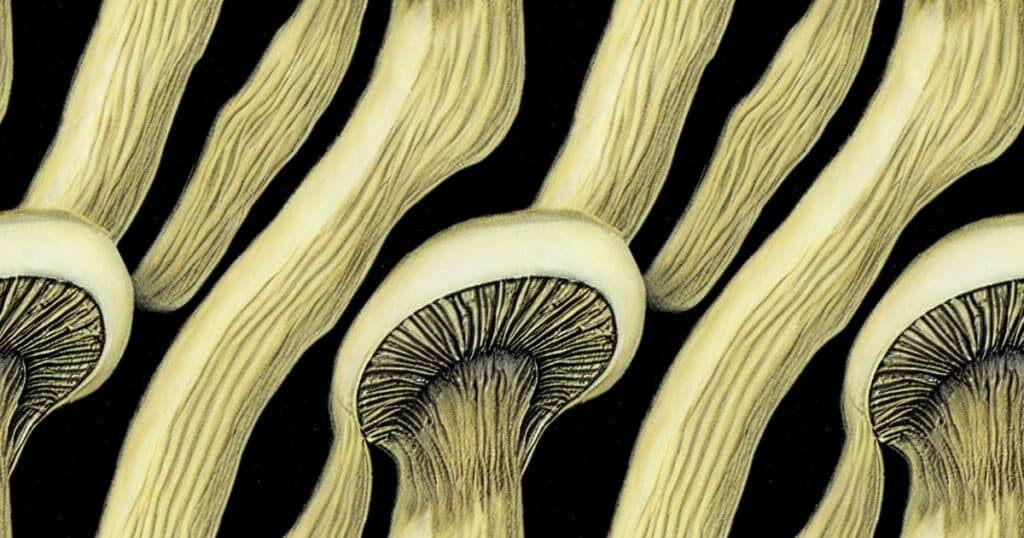
The Stoned Ape Theory is an evolutionary hypothesis proposed by American psychonaut and ethnobotanist Terrence McKenna. It states that consuming psychedelic mushrooms played a critical role in human evolution, leading to the development of abstract thinking and enhanced cognitive capabilities.
According to McKenna, consuming psychedelics allowed humans to become aware of themselves as a species for the first time; this self-awareness was essential for us to eventually form society as we know it today.
McKenna’s assertions are based on the idea that there had been no significant change in human behavior or cognition until roughly 50,000 to 40,000 years ago—the exact period during which our species began regularly consuming psychedelic substances found in nature.
By eating these mushrooms, McKenna argued, our ancestors experienced an evolutionary leap that allowed them to think abstractly and form cultures. This theory was first proposed in 1992 and has since gathered support from the scientific community and popular culture.

The implications of the Stoned Ape Theory are far-reaching; it suggests that psychedelics could be used as a tool to enhance cognitive capabilities or even treat mental health conditions. It also raises questions about the potential of using these substances for spiritual exploration or personal development. Finally, by providing insight into how humans evolved, this hypothesis can provide valuable guidance on how we interact with one another and our environment today.
The Origins of the Stoned Ape Theory
Terrence McKenna’s Stoned Ape Theory began to take shape in the 1970s when he was living in a communal retreat in La Chorrera, Colombia. There, McKenna and his brother experimented with psychoactive plants and brewed an ayahuasca-like tea; during these experiments, he experienced what many describe as a “visionary state,” which allowed him to gain insight into topics such as human evolution and psychedelic culture.
It was this experience that led McKenna to develop the Stoned Ape Theory. He argued that humans had been consuming psychedelics—such as psilocybin mushrooms and DMT-containing plants—since our species’ earliest days.
For McKenna, this consumption of psychedelics enabled humans to become aware of themselves as a species and gain the capacity for abstract thought. This shift in consciousness, he argued, was critical in allowing us to form our earliest societies and launch the process of human evolution.
While McKenna’s ideas have yet to be scientifically proven, his hypothesis has been adopted by many people interested in exploring the potential benefits psychedelics may have on our species. His theories have also significantly influenced popular culture; his books and lectures have inspired countless individuals eager to explore this concept further.
Exploring the Hypothesis: What Evidence Does It Provide?
The Stoned Ape Theory is a fascinating hypothesis, but it’s essential to consider the evidence that supports it. Several archaeological finds, such as the remains of psilocybin mushrooms found in ancient burial sites, suggest that humans have been consuming psychedelic substances for thousands of years.
Additionally, research into evolutionary biology has indicated that our species may have experienced accelerated development due to an increased intake of dietary nutrients or other environmental factors.
Despite this evidence, there are still many questions surrounding McKenna’s theory. For example, some experts argue that the evolutionary leaps attributed to psychedelics could instead be explained by genetic mutations or climate change; others criticize the idea for failing to take into account the role of social interaction and group dynamics in driving human development.
Despite these critiques, the Stoned Ape Theory remains an intriguing hypothesis. Even if it does not fully explain human evolution, it may offer valuable insight into how psychedelics can be used to explore our potential as a species and better understand our place in the universe. We may gain further clarity on this fascinating topic as more research is conducted.
Implications for Our Species Today
The Stoned Ape Theory has implications far beyond its role in human evolution. Instead, it can be seen as a call to action for us to consider our relationship with the environment and natural world; McKenna argued that psychedelics could help unlock our creative potential, allowing us to form deeper connections with nature and foster a greater appreciation of life on Earth.
Additionally, this theory suggests that psychedelic use is deeply embedded in our species’ evolutionary history. This may have implications on how we approach mental health today; several studies have suggested that psychedelics can be used to treat specific psychological issues such as anxiety and depression effectively.

The Stoned Ape Theory may also inform how we view human behavior and culture. Although some argue it provides evidence for the importance of individualist values, McKenna argued that psychedelics could instead help us develop a greater appreciation for our collective history. This may affect how we approach social issues such as race and gender equality, inspiring us to consider the complexity of human nature and embrace the diversity that has shaped our species.
In conclusion, the Stoned Ape Theory is an intriguing hypothesis that has far-reaching implications for how we view human evolution and our relationship with the environment. By examining evidence such as archaeological finds and evolutionary biology research, we can better understand McKenna’s theory and its implications for modern humanity.
Psychedelic substances may have played an essential role in our species’ development, offering us insight into our individual potential and collective identity. As more research is conducted, we may gain further clarity on this fascinating topic; regardless, the Stoned Ape Theory provides a valuable perspective on how psychedelics can be used to explore our place in the universe.
Keep updated on all the latest news and updates in the Cannabis industry here at Beard Bros Pharms by signing up for our Friday Sesh Newsletter here. Always Dank and Never Spam!
















